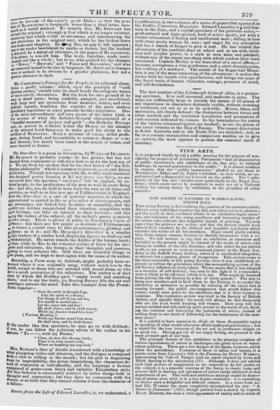The Star-Seer is a poem in live cantos, by WILLIAM
DEARDEN. Mr. DEARDVI is probably young : he has genius, but has not learned from experience or reflection how to make the best use of it. We see from his preface that he has that horror of" the Uti- litarian philosophy" which is common to juvenile poets and doting politicians. Though not agreeing with the worthy mathematician who despised poetry because it dii not prove any thing, we are convinced that the question " cui bone ?" will be applied, by ra- tional people, to the productions of the poet as well as every thing else : and this, too, we hold to have been the case in all times and countries' as well as in this iron age of Utilitarianism in England. Now the Star- Seer is a sort of metrical romance, in which the supernatural is carried to the ne plus ultra of extravagance, and ihe personages are linked with destinies so unearthly, that the mader can neither comprehend their situation, sympathize with their feelings, nor take an interest in their fortunes ; and this being the nature of the subject, all the author's poetry is merely thrown away. There is plenty of poetry in SOUTHEY'S Curse of Keham a ; but there are few people so destitute of Utilitarianism as to return a second time to that phantasmagoria, glowing and D as it is : and Mr. DEARDEN'S Star-Seer is a smaller magic lantern of a similar kind, displaying figures as shadowy and unsubstantial. He never sounds the depths of the human heart; othat while he flies to the remotest realms of fancy for his inci- dents and situations, his beings, in their thoughts and passions, belong to very ordinary life. Still there are beautiful things in poem, and we hope to meet again with the name of its author. Mortality, a Poem sung in Solitude, might probably have re- rosined where it was originally sung, without much loss to the world, except to those who are satisfied with sound alone, or who have a quick perception of the ridiculous. The author is of that class to whom the Goddess gave "empty words and sounding strain," and to say the truth, his flowing fluency fills the ear and sometimes amuses the mind. Take this example from the Proem. Poela loquitur- " Over the earth in thought I go,
Like the spirit of a dream ;
I've things to tell of joy and we, Yet untold to mortal ear,—
Let the sinner list and fear !
He shall freeze. and he shall scream, While my fancies round him teem." (Various Reading.) While my fancies round him teem, He shall sleep, and he shall dream.
If the reader like this specimen, he may go on with Solitude; if not, he can follow the judicious advice of the author in his Stanzas "To --, with my Poems."
" Close, oh close this dreamy book;
Place it in some sacred nook,
Where no laughing eye may look."
Mrs. BUTLER'S Star of Seville is contrived with a knowledge of What playgoing critics call Situation, and the dialogue is composed With a view to telling in the mouth ; but the plot is disgusting from its improbability, the action languishing, the characters de- ltoid of originality or individuality, and the language a fustian compound of green-room finery and imitative Elizabethan style. All this badness is occasionally relieved by better things both in thought and expression • but they have no connexion with the drama, or so little that they cannot redeem it from the character of a failure.


























 Previous page
Previous page